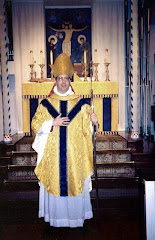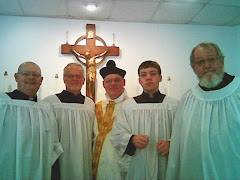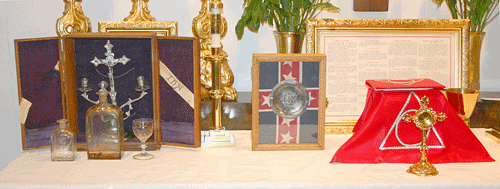
The Rev. J. Gresham Machen, D.D., who died out in North Dakota on New Year's Day [editor's note: 1937], got, on the whole, a bad press while he lived, and even his obituaries did much less than justice to him. To newspaper reporters, as to other antinomians, a combat between Christians over a matter of dogma is essentially a comic affair, and in consequence Dr. Machen's heroic struggles to save Calvinism in the Republic were usually depicted in ribald, or, at all events, in somewhat skeptical terms. The generality of readers, I suppose, gathered thereby the notion that he was simply another Fundamentalist on the order of William Jennings Bryan and the simian faithful of Appalachia. But he was actually a man of great learning, and, what is more, of sharp intelligence.
What caused him to quit the Princeton Theological Seminary and found a seminary of his own was his complete inability, as a theologian, to square the disingenuous evasions of Modernism with the fundamentals of Christian doctrine. He saw clearly that the only effects that could follow diluting and polluting Christianity in the Modernist manner would be its complete abandonment and ruin. Either it was true or it was not true. If, as he believed, it was true, then there could be no compromise with persons who sought to whittle away its essential postulates, however respectable their motives.
Thus he fell out with the reformers who have been trying, in late years, to convert the Presbyterian Church into a kind of literary and social club, devoted vaguely to good works. Most of the other Protestant churches have gone the same way, but Dr. Machen's attention, as a Presbyterian, was naturally concentrated upon his own connection. His one and only purpose was to hold it [the Church] resolutely to what he conceived to be the true faith. When that enterprise met with opposition he fought vigorously, and though he lost in the end and was forced out of Princeton it must be manifest that he marched off to Philadelphia with all the honors of war.
II
My interest in Dr. Machen while he lived, though it was large, was not personal, for I never had the honor of meeting him. Moreover, the doctrine that he preached seemed to me, and still seems to me, to be excessively dubious. I stand much more chance of being converted to spiritualism, to Christian Science or even to the New Deal than to Calvinism, which occupies a place, in my cabinet of private horrors, but little removed from that of cannibalism. But Dr. Machen had the same clear right to believe in it that I have to disbelieve in it, and though I could not yield to his reasoning I could at least admire, and did greatly admire, his remarkable clarity and cogency as an apologist, allowing him his primary assumptions.
These assumptions were also made, at least in theory, by his opponents, and thereby he had them by the ear. Claiming to be Christian, as he was, and of the Calvinist persuasion, they endeavored fatuously to get rid of all the inescapable implications of their position. On the one hand they sought to retain membership in the fellowship of the faithful, but on the other hand they presumed to repeal and reenact with amendments the body of doctrine on which that fellowship rested. In particular, they essayed to overhaul the scriptural authority which lay at the bottom of the whole matter, retaining what coincided with their private notions and rejecting whatever upset them.
Upon this contumacy Dr. Machen fell with loud shouts of alarm. He denied absolutely that anyone had a right to revise and sophisticate Holy Writ. Either it was the Word of God or it was not the Word of God, and if it was, then it was equally authoritative in all its details, and had to be accepted or rejected as a whole. Anyone was free to reject it, but no one was free to mutilate it or to read things into it that were not there. Thus the issue with the Modernists was clearly joined, and Dr. Machen argued them quite out of court, and sent them scurrying back to their literary and sociological Kaffeeklatsche. His operations, to be sure, did not prove that Holy Writ was infallible either as history or as theology, but they at least disposed of those who proposed to read it as they might read a newspaper, believing what they chose and rejecting what they chose.
III
In his own position there was never the least shadow of inconsistency. When the Prohibition imbecility fell upon the country, and a multitude of theological quacks, including not a few eminent Presbyterians, sought to read support for it into the New Testament, he attacked them with great vigor, and routed them easily. He not only proved that there was nothing in the teachings of Jesus to support so monstrous a folly; he proved abundantly that the known teachings of Jesus were unalterably against it. And having set forth that proof, he refused, as a convinced and honest Christian, to have anything to do with the dry jehad.
This rebellion against a craze that now seems so incredible and so far away was not the chief cause of his break with his ecclesiastical superiors, but it was probably responsible for a large part of their extraordinary dudgeon against him. The Presbyterian Church, like the other evangelical churches, was taken for a dizzy ride by Prohibition. Led into the heresy by fanatics of low mental visibility, it presently found itself cheek by jowl with all sorts of criminals, and fast losing the respect of sensible people. Its bigwigs thus became extremely jumpy on the subject, and resented bitterly every exposure of their lamentable folly.
The fantastic William Jennings Bryan, in his day the country's most distinguished Presbyterian layman, was against Dr. Machen on the issue of Prohibition but with him on the issue of Modernism. But Bryan's support, of course, was of little value or consolation to so intelligent a man. Bryan was a Fundamentalist of the Tennessee or barnyard school. His theological ideas were those of a somewhat backward child of 8, and his defense of Holy Writ at Dayton during the Scopes trial was so ignorant and stupid that it must have given Dr. Machen a great deal of pain. Dr. Machen himself was to Bryan as the Matterhorn is to a wart. His Biblical studies had been wide and deep, and he was familiar with the almost interminable literature of the subject. Moreover, he was an adept theologian, and had a wealth of professional knowledge to support his ideas. Bryan could only bawl.
IV
It is my belief, as a friendly neutral in all such high and ghostly matters, that the body of doctrine known as Modernism is completely incompatible, not only with anything rationally describable as Christianity, but also with anything deserving to pass as religion in general. Religion, if it is to retain any genuine significance, can never be reduced to a series of sweet attitudes, possible to anyone not actually in jail for felony. It is, on the contrary, a corpus of powerful and profound convictions, many of them not open to logical analysis. Its inherent improbabilities are not sources of weakness to it, but of strength. It is potent in a man in proportion as he is willing to reject all overt evidences, and accept its fundamental postulates, however unprovable they may be by secular means, as massive and incontrovertible facts.
These postulates, at least in the Western world, have been challenged in recent years on many grounds, and in consequence there has been a considerable decline in religious belief. There was a time, two or three centuries ago, when the overwhelming majority of educated men were believers, but that is apparently true no longer. Indeed, it is my impression that at least two-thirds of them are now frank skeptics. But it is one thing to reject religion altogether, and quite another thing to try to save it by pumping out of it all its essential substance, leaving it in the equivocal position of a sort of pseudo-science, comparable to graphology, "education," or osteopathy.
That, it seems to me, is what the Modernists have done, no doubt with the best intentions in the world. They have tried to get rid of all the logical difficulties of religion, and yet preserve a generally pious cast of mind. It is a vain enterprise. What they have left, once they have achieved their imprudent scavenging, is hardly more than a row of hollow platitudes, as empty as [of] psychological force and effect as so many nursery rhymes. They may be good people and they may even be contented and happy, but they are no more religious than Dr. Einstein. Religion is something else again--in Henrik Ibsen's phrase, something far more deep-down-diving and mudupbringing, Dr. Machen tried to impress that obvious fact upon his fellow adherents of the Geneva Mohammed. He failed--but he was undoubtedly right.
____________
From the Baltimore Evening Sun (January 18, 1937), 2nd Section, p. 15.
 The late Bishop Albert Chambers, shown at left, consecrated bishops for the Continuing Anglicans who adopted the Affirmation of St. Louis in 1977. We are asking Anglicans to recommit themselves to the Affirmation by leaving their names at the url underneath the Bishop's photo.
The late Bishop Albert Chambers, shown at left, consecrated bishops for the Continuing Anglicans who adopted the Affirmation of St. Louis in 1977. We are asking Anglicans to recommit themselves to the Affirmation by leaving their names at the url underneath the Bishop's photo.













